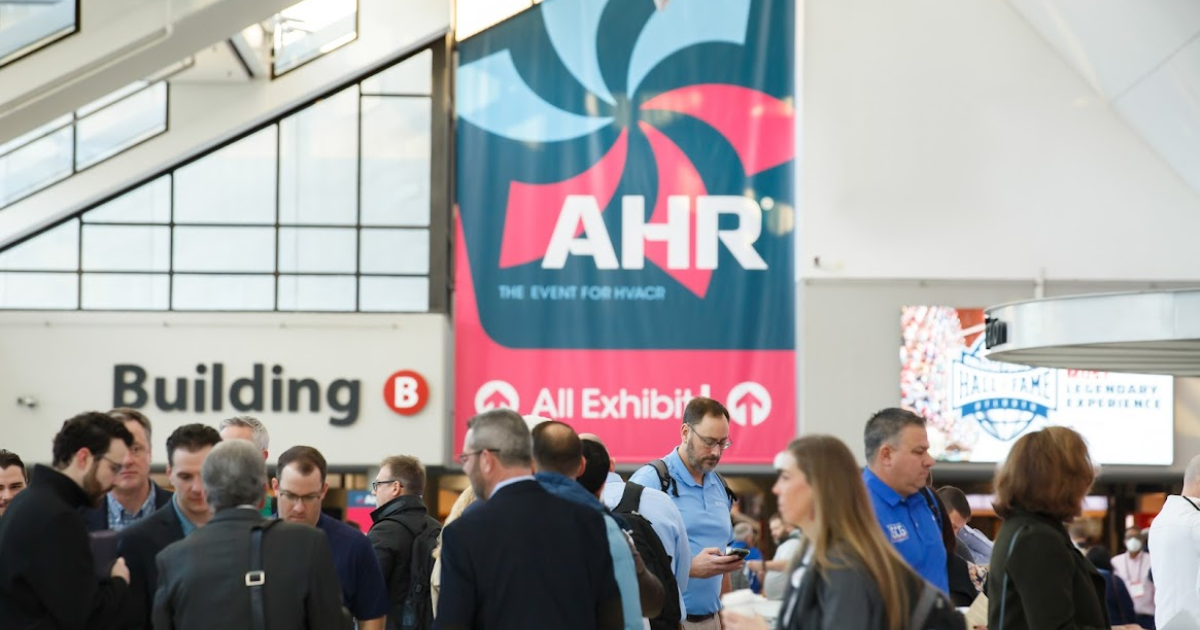Smart Building Thought Leaders Weigh In on AHR Expo

I recently attended the AHR Expo along with some 65,000+ other professionals across the wide expanse of the HVAC+R landscape. The AHR show boasted having over 1700 exhibitors and I can believe it, since it took up two huge Exhibit Halls plus the connecting bridge between them at the Georgia World Congress Center in Atlanta. The show was massive, almost doubling in size from 2022 but the numbers were not the only differences I noticed compared to past years; the biggest difference was the unbridled focus on automation and the advancement of technology across stakeholders to move the needle one more notch toward the holy grail of smarter buildings.
From the Smarter Summit 2023 on Sunday to the AutomatedBuildings.com sessions to follow, an impressive number of industry professionals gathered in classrooms to discuss topics once reserved for only the early adopters and those on the BAS fast-track: network interoperability, cybersecurity, analytics, standards, procurement, collaboration, the workforce, ESG, supply and demand, and lastly (but in no way a less important topic), addressing the shortage of young talent in the built environment. It felt like we had turned an important corner and everyone was in agreement: it was time to get back to work.
We asked a few industry leaders who attended this year's AHR Expo to share their thoughts from a smart buildings perspective:
 Another AHR Expo (2023), the biggest tradeshow in the U.S. devoted to HVAC has now come and gone. Was it a success? Without a doubt, absolutely. This year’s event was very crowded with attendees and a packed tradeshow floor with all kinds of new stuff. This stuff is taking HVAC products and solutions to the next level rapidly.
Another AHR Expo (2023), the biggest tradeshow in the U.S. devoted to HVAC has now come and gone. Was it a success? Without a doubt, absolutely. This year’s event was very crowded with attendees and a packed tradeshow floor with all kinds of new stuff. This stuff is taking HVAC products and solutions to the next level rapidly.
While several things caught my attention, the one area that stood out for me the most was how this industry is taking their cues from smarter buildings. More equipment and systems are accelerating and becoming connected and integrated, they are smarter with increased intelligence, are providing access to data and many are now offering a cloud component. As a result, this combination is transforming the industry from being just about offering equipment to one offering solutions.
Other observations: there was a lot of focus on the continued digital transformation journey, with emphasis on energy, decarbonization, sustainability, IAQ, and electrification. Also, sensors, sensors, sensors…they were everywhere along with applications for just about anything - "Hey, I have an app for that.”
On the education front, the 2023 version of AHR Expo seemed to have more sessions and opportunities to gain knowledge then I had experienced at previous shows. Here again, there looked to be several sessions that incorporated the “smart” and “data” aspects.
And finally, when walking the tradeshow floor there appeared to be more of the younger generation taking this all in. And yes, that is a good thing for us all!
 AHR Expo 2023 was a watershed moment for smart buildings. Starting with the Smarter Summit on Sunday before the Expo, some twenty thought leaders engaged with 150 industry participants for hours nonstop on several key topics, from how owners now demand information system technologies about their buildings, not just control and automation systems. The Summit then enumerated thirty initiatives reshaping the industry to deliver open and interoperable systems composable to building owners' and operators' exacting and changing needs.
AHR Expo 2023 was a watershed moment for smart buildings. Starting with the Smarter Summit on Sunday before the Expo, some twenty thought leaders engaged with 150 industry participants for hours nonstop on several key topics, from how owners now demand information system technologies about their buildings, not just control and automation systems. The Summit then enumerated thirty initiatives reshaping the industry to deliver open and interoperable systems composable to building owners' and operators' exacting and changing needs.
The culmination of the Summit was the release of the Div 2525 Framework , designed to help building owners and their advocates create Owner Project Requirements that lead to specifications of interoperable and truly open information systems for their buildings based on contemporary technologies rather than out-of-date approaches.
Thought leadership continued throughout AHR Expo education sessions, covering how to deliver multi-vendor interoperable systems, holistically dealing with cybersecurity, and addressing critical subjects such as diversity, workforce development, and a broad swath of issues around decarbonization, sustainability, and ESG.
 The buzz leading up to AHR 2023 resembled the energy that existed in our industry prior to Covid, and the event did not disappoint. The weather in Atlanta remained beautiful and the conference halls were sprawling with people eager to network, share, engage, and learn. The atmosphere was great!
The buzz leading up to AHR 2023 resembled the energy that existed in our industry prior to Covid, and the event did not disappoint. The weather in Atlanta remained beautiful and the conference halls were sprawling with people eager to network, share, engage, and learn. The atmosphere was great!
AutomatedBuildings.com and Cochrane Supply and Engineering developed an educational track, spanning two days, which featured a multitude of topics revolving around Smart Building Technology. I personally participated in two panel discussions, one on Monday covering Cyber Security for BAS, and another on Tuesday concerning trends in BAS design and the future role of Div 2525. Both sessions had over 175 attendees, and the feedback regarding the content has been amazing. From my perspective, audiences were less skeptical than ever about the industry’s push towards smarter buildings and cloud-based solutions versus on-prem. Building Automation is increasing, becoming more connected and integrated.
Obviously, building controls cannot be strictly cloud-based, concerns over power outages and loss of connectivity still cause many to question the move to the cloud. On-prem functions are still important for fail-safe backup controls, but cloud technology is being embraced, with thoughts on developing hybrid environments; where the cloud can best be implemented to streamline control functions, monitor energy usage for ESG concerns, and keep data safe with improved cyber security.
Another topic that resonated was in response to the current wave of remote work capabilities - Why would people go back to work if they know they can work from home? A response to this was that buildings of the future will compete for tenants based on their level of automation. The move to smarter buildings is not only critical for keeping up with control functions and environmental concerns, but also keeping up with how people live and work in the digital age.
 Let’s start off with the show venue itself. The attendance has dramatically increased since 2020 and there was a great mix of engineers, technology consultants, IT team members, system integrators, equipment vendors, owners, and contractors.
Let’s start off with the show venue itself. The attendance has dramatically increased since 2020 and there was a great mix of engineers, technology consultants, IT team members, system integrators, equipment vendors, owners, and contractors.
I was also impressed with the diversity of the groups attending and the different age groups that participated in panel discussions. What really impressed me most was the fact there has been more engagement with women thought leaders in this industry including their participation in panel discussion alongside men and all female panels that highlighted their challenges and accomplishments in the industry that in my opinion, is long overdue.
Some of the key things also observed is that vendors were highly focused on technology, sustainability, carbon reduction through equipment design including the capability to integrate data generated from that equipment into an owners BMS or energy management system for reporting building efficiency, equipment performance and key sustainability metrics. Finally, it is also important to note that participation from future generations in our industry was represented well and the interaction and collaboration with all the different age groups both at the show and at after hour events continued throughout the conference.
This Week’s Sponsor
Yardi® develops and supports industry-leading investment and property management software for all types and sizes of real estate companies. Established in 1984, Yardi is based in Santa Barbara, Calif., and serves clients worldwide. For more information on how Yardi is Energized for Tomorrow, visit yardi.com.
Read Next
 5/15/2025
5/15/2025
Tech, Talent and Transformation: 2025 Digie Finalists Announced For 27 years, Realcomm has presented the Digie Awards to acknowledge companies, real estate projects, technologies, and individuals that have advanced the commercial real estate industry through the strategic use of technology, automation, and innovation.
 5/15/2025
5/15/2025
Empowering Space Management with Data-Driven Visualization For effective CRE space management, it’s critical to centralize lease data, maximize rental square footage (RSF), improve energy efficiency and reconfigure spaces to meet changing needs.
 5/8/2025
5/8/2025
The AI-Powered Workplace Evolution: Redefining the Business Landscape In today's rapidly evolving business environment, the fusion of Artificial Intelligence (AI) and Workplace Management is revolutionizing the way organizations approach workspace optimization and operational efficiency.
 3/27/2025
3/27/2025
The Convergence of Edge Computing, Cloud, and AI in Building Automation and Smart Buildings In the built environment, we have seen the convergence of Operational Technology (OT) and Information Technology (IT), later expanding to include Workplace Technologies (WP).





%20(1)%20(1)%20(1).png)





